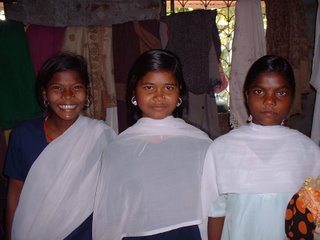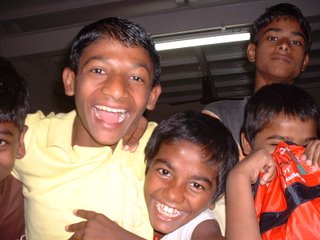This the first draft, so please don't mind any typos at this time...
ACCESS
The ACCESS Organization is a non-governmental organization that will address the problem of poverty, unemployment, lack of education, and homelessness for families in the urban environment.
Its’ approach is holistic, tackling the issue from all sides, including acting as advocates for the families in finding resources, helping families in dire need with the safety of a home and basic needs while helping them create a better future, providing educational opportunities including a crèche/preschool, a place for school aged children that have not yet been to school to prepare and gain skills, and a library, open to the public that promotes literacy and access to books, computers, and homework help.
The goal of the program is to holistically address these issues, help the families utilize what is available to them, and create a safe and steady present and a more promising future for the families we work this.
Programs:
1. Access Advocacy
ACCESS would be the biggest part of our organization, and would be open to the public- with a focus on aiding those who have trouble navigating the system and finding help. We would act as a point of access, enabling families to find resources to reach their goals.
GOALS:
1. To connect families to various services. This will involve meeting with the family, discussing options, and connecting the organizations that meet their needs. Organizations could include: schools, educational scholarships, skill building programs, adult literacy programs, housing programs, employment opportunities (see 4), utilizing government programs available, and so forth.
2. To organize and monitor organizations (NGOs, nonprofits, Governmental Programs, etc) which offer various services. Programs will be examined, and files created and kept detailing their work. Files will also be kept on how families referred from us felt about the organization, if it was helpful, etc.
3. To aid families in filling our forms and collecting various pieces of information that may be needed to meet their needs. This could include filling out government forms, scholarships, job applications, etc. Additionally, a place for each family to safely store important documents will be made available
4. (Possible addition) Records kept of relevant job opportunities. Our organization would review each workplace offered to us, making sure those offering jobs are honest, and do not maltreat their workers. We would follow up with those hired, making sure they were being treated well, given the wage promised, etc.
PHYSICAL SPACE:
The ACCESS unit would need rooms for meeting with families, a file system (computer and paper (if needed) to record and maintain information. It would also need safe dry waterproof containers for families to safely deposit important records they need to maintain.
EMPLOYEES NEEDED:
We would need employees with a vast knowledge base of the programs to meet with families, discuss options and find organizations, which will help them. Additionally, they would need to help families to fill out forms, applications, and so forth. Employees would also be needed to go to various organizations, find out their willingness to be added to the ACCESS network, maintain contact with them, and help review their services. The number of employees would vary once need is determined. (3+)
2. Crisis Center
The family crisis center would consist of four small family homes on the premises with simple but safe facilities. Each family would receive individualized care and services with the goal of helping them gain steady employment, education, and a safe place to live. This program is designed to aid individual families, slowly, with the ultimate goal of the family creating a foothold and moving out of the center when they are ready.
GOALS:
1. To find families living on the street, and bring them to our temporary shelter.
2. Help family meet basics (housing, food, health care, clothing) and feel secure. Find out family’s story and their goals.
3. Find appropriate ways of aiding family in improving situation. This may include: helping find employment, improving skill base, literacy training, securing housing,
4. As needed, allow family members to take advantage of our other services while living in the center and after leaving. Programs include crèche/pre-school, ‘catch-up’ school, adult literacy program, ACCESS Program, and so forth.
PHYSICAL SPACE:
The family crisis center would consist of 4 small family home units consisting of kitchen, bathroom, sleeping room(s) and verandah. Each unit would have running water, a water filter, fans, coolers, electricity, and basic furniture. (More personalized items would be provided to each family as needed). The homes would open into a large courtyard with grass, trees, and a vegetable garden. The homes would be located on the same land as the other programs, allowing families staying in the homes to utilize them as needed.
EMPLOYEES:
The center would involve working with employees in all other programs. Additionally, there would be a counselor provided specifically for these families to speak with them regularly and help them determine and plan their goals, explain the center and so forth. This counselor would also be involved in checking the family into the center. A ‘scout’ would be needed to go to where families are living on the streets, meet with them and gain their trust, and then aid families who wish to come to the program. Eventually this person may be hired from a former family who stayed in the center. For the homes, a person to be in charge of general upkeep and repair of the homes, cleaning between families, and keeping the courtyard in proper order would be necessary. A night watch person would be needed to maintain safety of premises during night hours. A local doctor would be hired to provide families with medical care upon move in. (It would be determined whether or not a full-time doctor would be needed, or whether one with a nearby practice would have enough time to spend with the families)(4-5)
3. Educational Programs.
Education Programs for children at ACCESS would consist of a few different programs: first a crèche/pre-school for young children where they can play and gain a foundation for skills needed in school while their parents are working, a “Catch-up” school for school aged children who had not yet been to school but would like to go. This school would give consist of a high student-teacher ratio and help the children make gains in basics such as literacy, math, etc before being placed into a school program. Lastly, our program would house a small public child-friendly library where children would have access to books, computers, and a study room where tutors would be available to help with homework questions. Programs such as story time, computer classes would help children gain skills in various areas. This library will also have materials available for adults.
GOALS:
1. The crèche/pre-school attempts to address three problems at once: parents who must work but have no one to take care of their young children, parents who work and must keep older children out of school to care for younger ones, and exposure to school environment, literacy skills etc in preparation for school years.
2. The “Catch-up” school will give school-aged children who have not yet had a chance to attend school the opportunity to be exposed to and learn many skills to enable them to be placed in a school setting. The environment will be child-friendly, and allow the children to explore the school setting and gain the necessary skills to continue their education.
3. The library will give children access to books, programs, computers (for educational purposes), a safe and quiet place to study, and tutor help if needed, to help them make gains in their education. In these ways, the library will continue to encourage literacy and skill building outside of the classroom setting, and will allow any child to access its programs. The library can also foster community involvement by creating clubs for children to make an impact on their communities. Clubs such as one on the environment or social justice could make an impact on the community and teach the children that they can make a difference.
PHYSICAL SPACE:
The crèche/pre-school would involve a baby area for young babies, including cribs for napping. The area for toddlers to preschool age would be an open room with various age-appropriate toys and activities. A small kitchen would be attached and allow for meal preparation for the children, as well as a bathroom as needed for the children. The rooms would open onto the main courtyard, where the children can play safely on age-appropriate playground equipment.
The catch-up school would involve a room with large tables where children can work on projects. The room would be child-friendly, and contain various games, books, etc for working with the children. A Chalkboard would be situated at one end of the room.
A girls and boys bathroom would be available for the children. A separate bathroom would be available for employees.
The library would consist of a large children’s room lined with books, tables in the center for studying, a desk area for librarian and tutor, and a designated computer area. A corner would be designated for story time. An additional room would house adult books of a wide variety. A public set of bathrooms would be available.
EMPLOYEES:
The crèche/preschool would need appropriately trained persons/teachers to work with the infants and toddler children. Additionally, older students such as college students may be employed part-time as aides to the main teachers. (3+)
The catch-up school would require well-trained teachers to work with students in a non-formal schooling environment. The number of teachers should be high, depending on the number of students. (1+)
The library would require a librarian, a head-tutor, as well as some younger (high-school or college students) part time tutors to help during after school hours. Additionally, a person well versed in computers to teach computer literacy and keep computers updated and working properly. (4+)
Club leaders could be volunteers from the community.
Additionally, Hindi-speaking (or Hindi-learning) volunteers from outside that are trained/training in education or have experience working with children may come for periods of time to work with any of these three programs. (?)
4. Skill Building
The Skill Building program aimed at adults that will offer a variety of opportunities that can lead to gaining employment, gaining better employment, improving their situation, or navigating the urban environment. It will include a variety of programs, depending on need, and will always include basic literacy programs for adults. This program would work with the adult family members living in the crisis home as well as adults from outside interested in the programs being offered.
GOALS:
1.To allow adults to gain basic literacy skills so they can better navigate their environment and their workplace.
2. To give adults a chance to learn various skills to help them gain employment or improve their employment situation. This may include programs on starting a small business, learning math for work environment, handicraft skills, carpentry, sewing, and so forth. These programs would be offered to coincide with interests and concerns of adults interested.
3. Offering programs for adults that aim to improve family situations such as creating a family vegetable garden in a small space, nutrition for the family, family planning, domestic violence, health care, saving money, navigating banks, etc.
PHYSICAL SPACE:
The adult programs may use other spaces such as the “catch-up” school or library for evening classes. If the program necessitates daytime classes, a single multi-purpose room may be needed. A storage area would be needed for the materials needed for specific skill building, such as sewing machines, tools, etc.
EMPLOYEES:
Various skilled persons may be employed for different programs and projects. One adult would be employed regularly to teach night literacy classes. Volunteers may also be a viable option for this program (1+)


